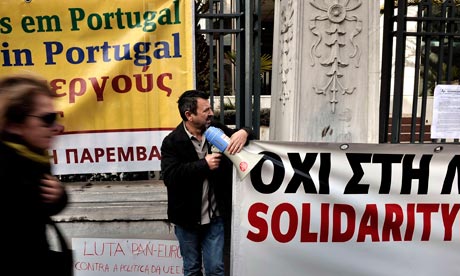
Greek supporters of Portugal's strikers outside the Portuguese embassy in Athens this week. Photograph: Aris Messinis/AFP/Getty Images
Maria is a softly spoken teacher, but she's clearly furious. As far as she is concerned, she is being mugged by the economic and political elite. "I think they are stealing from us," she tells me. "It's theft." Maria Juan spoke to me in the centre of Lisbon as thousands of striking workers – some even angrier than her – surrounded Portugal's national assembly.
It's a different country, but her sentiments are instantly recognisable to a Brit. This is the indignation of someone who has dedicated their life to public service being pummelled by a crisis they had no role in causing. On Thursday, hundreds of thousands of workers ranging from train drivers to hospital staff took part in Portugal's second general strike against austerity in a year. Next Wednesday, their British equivalents will stage a similar walkout, and "theft" will be on many of their lips, too.
Anyone who has taken part in Britain's anti-cuts demonstrations over the last year would have felt right at home outside the national assembly. Many of the chants were the same: some, such as "the workers united will never be defeated", I have heard yelled on protests from London to Michigan. But – as in Britain – workers remain far from united. As I talk to two striking bus drivers, proudly waving union banners, a woman with two kids starts ranting at them. It's a familiar complaint: she works long hours for worsening pay, but – like the vast majority of private-sector workers – you don't see her out on strike. It's a hierarchy of grievances that allows rising fury at declining living standards to be directed at fellow workers, rather than at those responsible for Europe's economic collapse.
There was a familiar resentment of police, too, who formed lines to stop the national assembly being stormed (which, according to Marta, a young temp agency worker, was exactly what needed to happen). A few bottles were thrown, and protesters angrily remonstrated with them: "You should be protesting with us, not defending the bad guys!"
Of course, Britain's strike – the biggest since the general strike of 1926 – won't exactly be a replica. The focus is on pensions – or, more accurately, a tax on public-sector workers to help pay off the deficit. The narrow focus is partly a consequence of Britain's almost uniquely stringent anti-union laws. In Portugal, anger is directed at the terms of a€78bn bailout package imposed by the IMF and the EU, which is being implemented enthusiastically by the Portuguese prime minister Pedro Passos Coelho. Christmas bonuses for public-sector staff are the latest casualty. This alone is a crippling blow to workers in a country in which the minimum wage is just €450 (£386) a month, and where teachers such as Maria have a monthly salary of just €1,000 (or £858).
Both Portuguese and British strikes are part of a growing European backlash to austerity that is erupting on to the streets from Madrid to Athens. Like Britain, widespread industrial action is uncommon in Portugal. Since the authoritarian regime of António Salazar was overthrown in the 1974 carnation revolution, there have only been two national strikes – and one of them was a year ago. The strike is not a response to economic crisis, but rather resistance to attempts to use it to remake European societies. Rightwing politicians may have wanted to "shrink the state" before the crisis hit, but the radical policies needed to achieve it were not politically possible. But privatisation, cuts, the rolling back of workers' rights and the reduction of pay can now be dressed up as unavoidable decisions. Unless resistance to this project is successful, Europe will be a poorer, harsher and more insecure place long after sustained economic growth returns.
Outside the Portuguese national assembly, protesters expressed a determination to stand with other European workers. "We are joined to the people of Europe," says Francisco, a retired civil engineer. "We have to fight all together or we will lose." But talk of solidarity is easy: in practical terms, there are few links between Europe's striking workers. None of the Portuguese workers I spoke to were aware of next week's public-sector strike in Britain.
When up to 3 million British public-sector workers strike together next Wednesday, they will aim fire at the policies of David Cameron's government. But Francisco is right: it is difficult to see how a Europe-wide austerity drive will be defeated without an equally Europe-wide movement against it. That dinner ladies, bin collectors and teachers will take co-ordinated action is no small achievement. But the battle for the future of Europe will only be won when nurses in Aberdeen are making common cause with bus drivers in Athens. After all, we're all in this together.

Δεν υπάρχουν σχόλια:
Δημοσίευση σχολίου
Πρώτη προειδοποίηση!
Θα σας παρακαλούσα τα σχόλια να παραμένουν εντός θέματος.
Θα σας παρακαλούσα τα σχόλια να είναι ευπρεπή.
Αλλιώς θα αναγκαστώ να πάρω μέτρα.